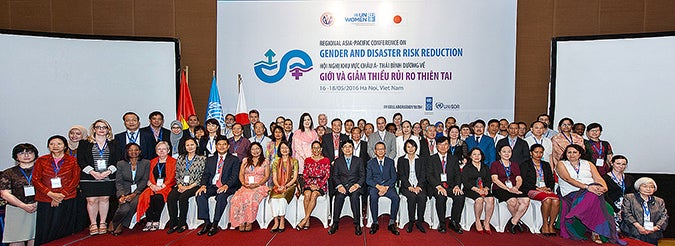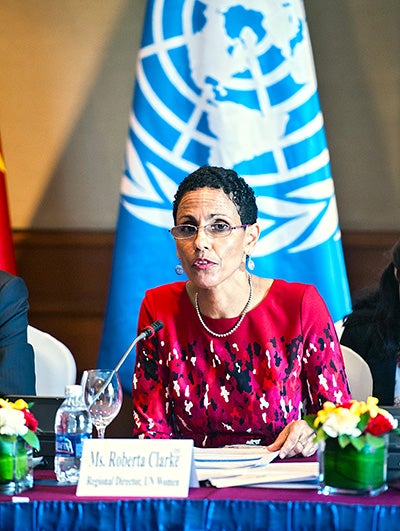Women hold key to addressing disaster risks
Date:
Ha Noi, Vietnam – The vital role of women in reducing the risk of disasters is being highlighted in a regional conference that opened today in Ha Noi. Experts from 22 countries have gathered to call for urgent action to promote gender equality in disaster risk reduction programmes and policies, particularly in implementing the Sendai Framework for Action on Disaster Risk Reduction.

As the most vulnerable region with seven out of the world’s 15 most ‘at risk’ countries, Asia-Pacific is particularly susceptible to the growing impacts of climate change. Whilst disasters do not discriminate, their impacts affect men and women differently. Globally, women and children are 14 times more likely to die or be injured during a disaster than men. Systematic discrimination of women not only contributes to higher mortality rates, but also compromises their overall resilience and ability to respond. Although women often face more severe impacts, they also hold the key to minimize disaster-related risks. Experience from many countries shows that women play a vital role in reducing disaster risk and adapting to climate change, yet this often goes unrecognized.
To ensure the region can build women and men’s capacities and resilience against future disasters and climate change at every level, the Regional Asia-Pacific Conference on Gender and Disaster Risk Reduction will identify the critical gender equality priorities and actions that national government and other stakeholders need to take to implement the Sendai Framework. The conference, jointly organized by the Viet Nam Central Steering Committee for Natural Disaster Prevention Control and the United Nations Entity for Gender Equality and the Empowerment of Women (UN Women) in collaboration with the United Nations Office for Disaster Risk Reduction (UNISDR) and the United Nations Development Programme (UNDP) with support from the Government of Japan, will also identify support needed to make these commitments a reality.
Opening the conference, H.E. Mr Cao Duc Phat, Minister of Viet Nam’s Ministry of Agriculture and Rural Development, Head of Central Steering Committee for Natural Disaster Prevention Control stressed that: “Experience in Viet Nam shows that women are the first people to prepare for disaster response activities in their families and also for community resilience. As a co-organizer of the conference together with UN Women and the Government of Japan, Viet Nam is calling on other countries to jointly implement gender-responsive disaster risk reduction priorities in the Sendai Framework”.

Speaking at the conference, Ms.Roberta Clarke, UN Women Regional Director said: "Women in Asia and the Pacific are able and capable. They are a key lynchpin for addressing disaster risks and for resilience building of themselves and their communities. As we implement our regional, national and local disaster risk reduction priorities, we should provide them the space to lead, to make their voices heard and have their priorities addressed".
The three-day conference will discuss urgent measures to promote gender equality and promote women’s leadership throughout four priorities of Sendai Framework for Action: understanding disaster risks; strengthening disaster risk governance to manage disaster risks; investing in disaster risk reduction for resilience and enhancing disaster preparedness for effective responses, recovery, rehabilitation and reconstruction. Taking into account the complexities of addressing disaster risk reduction the region is confronted with, the conference will also discuss the interlinkages between disasters and climate change and how climate change action can contribute to addressing disaster risk reduction challenges and promoting women’s leadership and participation. Furthermore, in recognizing that most affected women and men are often from rural locations and make up the poorest of the region’s population, the conference will also tackle issues to promote gender equality through community-based disaster risk management at community level.
About 70 government officials, NGOs and researchers from 22 countries will attend the conference as well as 200 representatives from government, inter-governmental organizations, academia, United Nations, development organizations, Red Cross, civil society and media in Viet Nam.
The conference will conclude with the endorsement of the Recommendations and Actions on Gender and Disaster Risk Reduction Priorities for Asia-Pacific. The outcome document of the conference will be introduced to relevant national and regional processes for the implementation of the Sendai Framework for Disaster Risk Reduction 2015-2030.
Documents and Presentations
- English (zip: 36 Mb)
- Vietnamese (zip: 38 Mb)
Photo Gallery
Background
The Sendai Framework for Action (2015-2030) was adopted at the Third World Conference on Disaster Risk Reduction in Japan in March 2015. Its guiding principle states that ‘a gender, age, disability and cultural perspective should be integrated in all policies and practices, and women and youth leadership should be promoted’. One year after the adoption of the Sendai Framework for Disaster Risk Reduction, all countries in the Asia and Pacific region are developing national action plans to implement the Sendai Framework.
Media Contact:
Please contact: Thao Hoang Bich
Communications Officer for UN Women Viet Nam
Tel: +84 4 3942 1495 (ext. 203) Mobile: 012 0514 3996
Email: h[ Click to reveal ]
